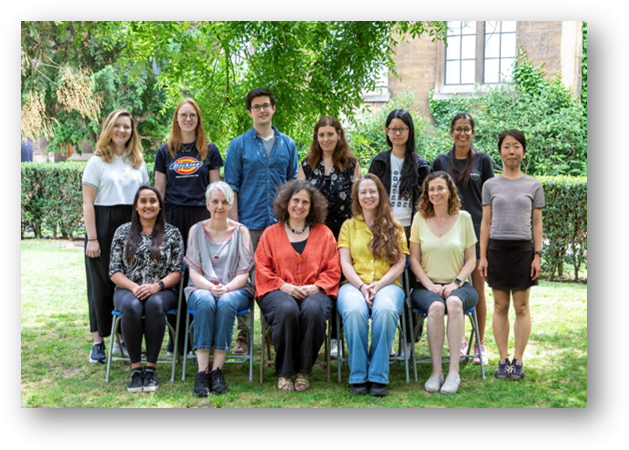
Epigenetic Control of Developmental Processes and Genome Function in Mammals
Research Interests
Our lab focuses on the molecular events governing pre- and post-natal mammalian development. Our research is focused on two areas; investigating the developmental role of imprinted genes and the epigenetic mechanism(s) controlling their parental-origin specific expression and the epigenetic control of genome function during development in a wider context with particular interest in repetitive elements.
Genomic imprinting and parental-origin effects – a paradigm for understanding the epigenetic control of transcriptional processes.
Genomic imprinting is a remarkable normal process that causes some genes to be expressed solely from maternally inherited chromosomes and others from paternally inherited chromosomes. This means that the egg and sperm contribute unequal functions to the developing conceptus through the parental-origin specific expression of imprinted genes. In mouse and man, disorders can arise when the dosage of imprinted genes is altered through imbalances in the parental-origin of particular chromosomes, by mutations in the single active allele or by mutations affecting the imprint process. Over the years we and others have contributed to understanding aspects of genomic imprinting including the epigenetic mechanisms that programme functional differences between the two parental chromosomes and generate a heritable memory of parental origin. More recently, our work has focused on the processes required to maintain this memory during the period of preimplantation epigenetic reprogramming when most of the genome erases then re-establishes new epigenetic states. In addition, we have explored the function of imprinted genes in development and disease and the evolution of imprinting and its epigenetic control. Much of our work has focused on the Dlk1-Dio3 imprinted domain on mouse chromosome 12 which contains paternally expressed protein coding genes and multiple non-coding RNAs expressed specifically from the maternally inherited chromosome.
Our current interests are focused on continuing to understand the function of imprinted genes in a range of developmental processes including post-natal resource control via lactation and the development of specific lineages in vertebrates including the central and peripheral nervous system. These studies are providing useful insights into the functional pathways involving imprinted genes and contributing to our understanding of the evolution of imprinting. In addition, we are actively exploring the factors and features that regulate of imprinting both at short and long range. This includes understanding the role DNA binding proteins including KRAB-zinc finger proteins and CTCF in cis-acting control. These studies take us into the area of epigenetic inheritance and the establishment and maintenance of epigenetic states within and across generations.
Epigenetic inheritance: epialleles, retrotransposons and the environment.
Our studies on genomic imprinting as a paradigm for understanding aspects of genome function and its epigenetic control in a wider context has taken us on several journeys including studying the environmental modulation of epigenetics states and a consideration of the mechanisms that might contribute to non-DNA sequence based inheritance in mammals (often known as transgenerational epigenetic inheritance). We have recently generated and integrated high quality genomic, epigenomic and transcriptomic datasets from purified populations of ex vivo cells allowing us to explore the relationship between particular genomic features including the repeat genome, epigenetic states and phenotype using inbred strains of mice.
One major role for epigenetic modifications has been in the ‘management’ of repetitive elements and in particular retrotransposons. Repetitive elements represent 40-50% of the mammalian genome and these are targets for the repressive epigenetic machinery via targeting by KRAB-zinc finger proteins – hence emphasising epigenetic parallels between imprints and repeats. We have identified repetitive elements that exhibit different epigenetic states between different individuals – so called ‘metastable epialleles’. Epialleles have the potential to result in transcriptional differences between genetically identical individuals. We are studying the establishment and maintenance of these epialleles and determining the extent to which they regulate gene expression and whether they might confer phenotypic differences between individuals. We are determining the mechanisms by which epialleles are established and maintained within individuals and across generations and testing whether they are sensitive to the environment and hence mediators of environmental effects on genome function.
The lab currently integrates both ‘wet’ and ‘dry’ research with bioinformatics and in silico genomics activities taking place alongside molecular genetics laboratory research, high-throughput genomics, stem cell and tissue culture approaches and the use of mouse (and currently zebrafish) genetic and developmental models. These approaches provide opportunity for inter-disciplinary discussions and study designs to both generate and test hypotheses and they also involve the analysis, development and improvement of computation and bioinformatics tools for epigenomic and functional genomic analysis. More recently we are taking more theoretical and mathematical modelling approaches to consider the relationships between genome, transcriptome and epigenome.
Our team is an international one and practises family-friendly research activities. We freely exchange data and ideas with other groups and enjoy joint lab meetings and retreats with colleagues working in related areas. We are highly collaborative and welcome trainees at all levels of seniority from both within and outside Cambridge. Our work is currently funded by the UKRI Medical Research Council (MRC) and Biology and Biotechnology Research Council (BBSRC), the Wellcome Trust, and the US National Institutes of Health (NIH). Individual members are the recipients of independent postdoctoral research fellowships and PhD studentships.
